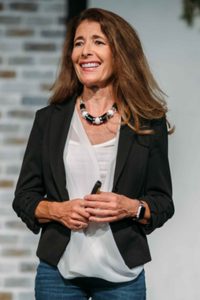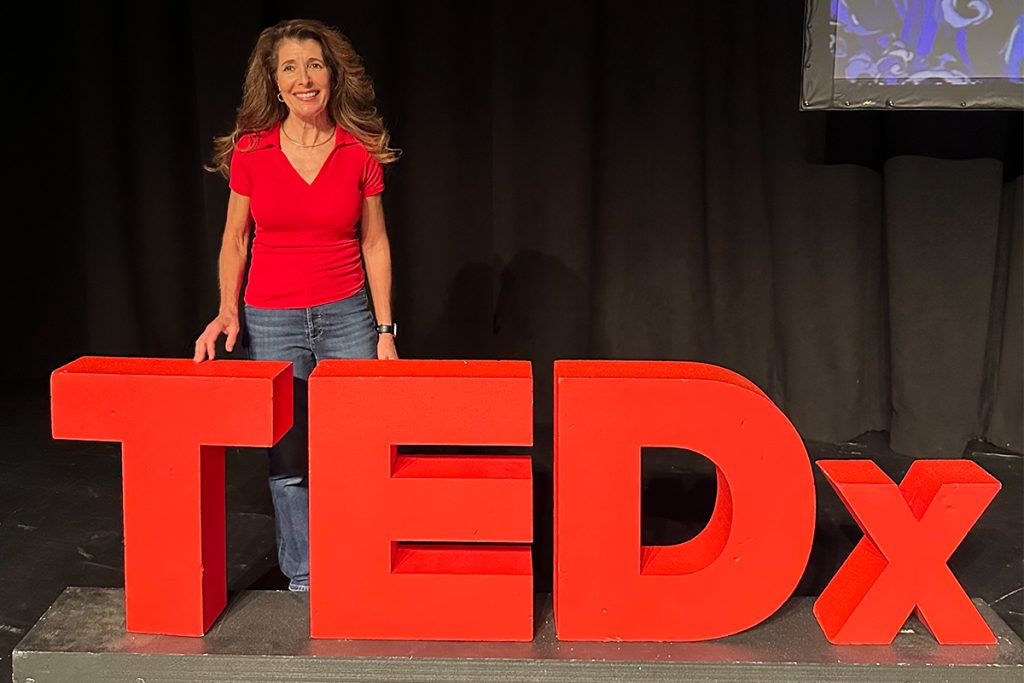Julia Nicholson’s life story is a testament to resilience, perseverance, and transformation. From unimaginable trauma to improbable success, Julia’s journey is not just a personal triumph, it is now a mission to empower the next generation with the tools that helped her rise. Her current focus is a framework she calls Power Shift, designed to show young people they already hold the keys to their strength, freedom, and future.
 A Life Forged in Challenge
A Life Forged in Challenge
Julia’s life was marked by profound challenges. At 18, she was a passenger in a car which was struck head-on by a drunk driver, a collision so severe she said, “I should have never survived it.” Disfigured and forced to leave college, she entered an abusive marriage, eventually fleeing at 26 “with my three-month-old and my three-year-old and the clothes on my back.” By 38, she had become CEO of a multi-million-dollar company, earned her degrees, and raised two happy, healthy teenagers.
Even as success blossomed, tragedy struck again. Julia lost her beloved husband to suicide, a loss she described as being “thrust into the darkest place I’ve ever been.” This devastating event forced her to confront grief at its most profound level and deepened her empathy for those struggling with emotional pain. Rather than succumbing to the despair she felt, she allowed this experience to forge her purpose. It strengthened her resolve to help others recognize the power they hold, even when they are pulled down into the rabbit hole of hopelessness and despair.
Julia explains, “These are five things every single human being on the earth has, and I think the next generation needs to know they have them.”
Pivot Your Perspective
Julia recounts her car accident: how a penny lodged in her seatbelt buckle prevented her from removing it, a small miracle that saved her life. The penny carried the words “In God We Trust,” a phrase that held deep spiritual meaning for Julia because it symbolized divine intervention and affirmed her belief that she was spared for a reason.
After the accident, Julia spiraled into self-pity, asking herself over and over, “Why me?” as she struggled with disfigurement, shame, and the belief that her life was over. But her father, a Marine, reminded her that “you have to improvise, adapt, and overcome.” His words planted a seed that led to a profound change. One morning, she woke up asking a different question: “Why not me?” This simple shift helped her move from victimhood into curiosity and gratitude, allowing her to recognize the chain of miracles that made her survival possible.
Overwrite Your Self-Talk
Julia observed, “What you say to yourself matters . . . you control the direction.” Through her experience, she discovered how easy it is to internalize criticism and negative beliefs, many inherited from childhood or shaped by the harsh voices of others. A person’s inner dialogue often echoes old judgments like, “I’m worthless” or “I’m not good enough,” and these patterns can become automatic, reinforcing a false sense of powerlessness.
But Julia offers a powerful reframing. She suggests that the very strength of insecurity, hopelessness, or self-doubt is evidence of the immense power already present. The same mental energy used to tear oneself down can be redirected to build oneself up. Her message is that awareness is the key: as soon as we recognize that these negative scripts are running, we can pause, challenge them, and replace them with new, empowering beliefs.
“A human being is the only living thing that limits its potential because of its own choices,” she explains. Recognizing that choice is the beginning of reclaiming personal power.
Wear Your Life Experiences Proudly
Julia said, “All of the things you’ve been through . . . they’re nothing to be ashamed of. They take a lot of energy to pretend like you haven’t been through something.”
For years, she kept her struggles hidden behind a polished professional image. Few knew the depth of her pain or the traumas she had endured. That distance may have protected her from judgment, but it also isolated her and kept her burdened by secrecy and shame.
It was only when Julia began sharing her full story, not for sympathy but to speak the truth, that she discovered profound freedom. Speaking openly about her life experiences, including surviving an abusive marriage and losing her husband to suicide, allowed her to release the weight she had been carrying silently.
Whenever we hide our shame or guilt, we give it power over us. When we tell even one person, we bring light to the shadow and begin to free ourselves from its grip.
“When you lay down the burden of shame and share with one person, the truth has no power over you anymore,” Julia explained. This shift transforms painful memories into proof of resilience and survival. Owning one’s story, she says, is the path to freedom and genuine connection.
Her diamond metaphor conveys this philosophy perfectly: “Diamonds really are just carbon buried in darkness . . . subjected to intense pressure and stress to become something of value. They don’t break. They transform. And so do you.”
Embrace Change
Julia explained, “Resisting only makes it harder for you, and it’s going to happen anyway . . . how can you lean into it?”
Change is a constant, yet many of us approach it with fear, resistance, or reluctance. Julia reminds us that resisting change not only delays the inevitable but also increases suffering. Instead of fighting change or begrudgingly accepting it, she invites us to welcome it fully and look for the opportunities it holds.
Julia knows what it means to face unwelcome changes: being forced to leave college after her accident, rebuilding from nothing after escaping abuse, and navigating the grief of her husband’s death. In every case, it was only when she embraced her new reality that she could move forward and discover unexpected paths of growth and healing.
Her message to young people is simple: change is coming whether you want it or not. The sooner you can stop resisting and start asking, “What can I learn from this? What opportunity is here for me?” the sooner you reclaim your power.
Release Control Over the Outcome
Julia noted that “too many times we focus on the outcome . . . when someone else’s decision is involved, we need to focus on our inputs.”
This shift is about recognizing the limits of our control. Julia points out that we often waste emotional energy trying to manage outcomes that depend on others, such as their choices, judgments, or reactions. She knows this intimately, having navigated difficult custody battles and corporate decisions where others held the final say.
Rather than exhausting ourselves striving for a particular result, Julia encourages us to turn inward and ask, “Where can I act with integrity and intention right now?” We cannot control what others decide, but we can control the effort, care, and presence we bring to every situation.
Letting go of attachment to outcomes is not about giving up. It is about releasing ourselves from frustration that arises when we confuse influence with control. Julia’s message is clear: freedom comes when we invest energy where it can make a real difference, in our actions, our mindset, and our heart, rather than wasting energy where it will be drained.
Empowering the Next Generation
Julia is writing a pocket guide for youth and creating a nonprofit to fund speaking tours, ensuring students everywhere hear this message. “I’m not focused on income. I’m focused on impact,” she affirmed.
Julia Nicholson’s message to young people is clear and urgent: your power is already within you. The Power Shift framework is not just a set of ideas, it is a map born from lived experience, offering the next generation a way to not just endure life’s challenges but to transform through them.
The call to action is simple: Now is the time to pivot perspective, overwrite old narratives, wear your story proudly, embrace the inevitability of change, and release control over the outcomes you cannot shape. In doing so, as Julia demonstrates so powerfully, we move forward stronger.
Audrey Keller is a freelance writer who contributes articles to cover topics and stories that are relevant locally and or nationally.



